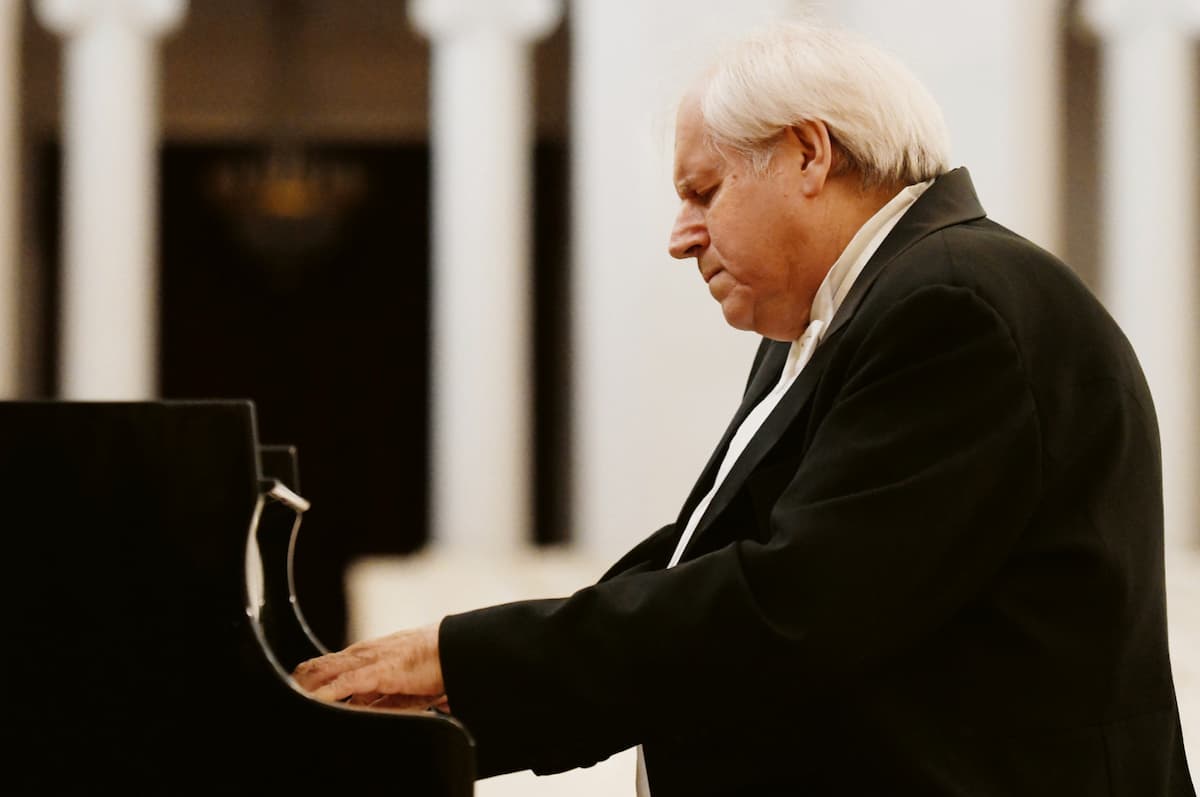To say one witness magic at Sokolov’s concerts is no exaggeration. Only one day after Krystian Zimerman gives a recital in Wuppertal, Grigory Sokolov is to perform in Frankfurt – this opportunity simply cannot be missed, not to mention coincidentally both are playing Bach’s Partita No. 2 (but with radically different approaches).
The programme commenced with Bach’s 4 Duets, BWV 802-805, a lesser-known set arguably included in Clavier-Übung III. The two voices were so flawlessly characterised, not merely in the way the voices interacted with each other but also in how each was given an individual character. This was coupled with subtly layered dynamics, Sokolov’s trademark trills and crystal-clear articulation, by which every syllable of the diction was clearly enunciated.

Grigory Sokolov © klassikakzente.de
Sokolov transitioned to Bach’s Partita No. 2 in C minor without a single break. The Sinfonia unfolded with monologue-like intensity, while the Allegro section showcased again immaculate voicing while maintaining striking clarity amidst the interplay of voices across different registers. This unbelievable clarity held steady throughout the ensuing movements. In the Sarabande, the left hand not only served as an accompaniment but was also carefully sculpted. In a way similar to how he treated Chopin’s Mazurkas in the second half, Sokolov imbued the Sarabande with such profundity and stillness that time seemed to stop. The rhythmic vigour and refined ornamentation in Rondeau and the playfulness in Capriccio proved nothing but his consummate musicianship, with his almost mathematically (but by no means mechanical) precise, cerebral yet deeply human approach.
The second half opened with Chopin’s 4 Mazurkas, Op. 30 and 3 Mazurkas, Op. 50, where tonal control remained impeccable and pedalling was judiciously applied. Sokolov’s Chopin Mazurkas have been an acquired taste for me – where others may dance, he transformed these miniatures into philosophical ponderings, each a world of its own and a story compellingly narrated. Literally every note was handled with utmost delicacy that altogether created otherworldly poetry. In particular, Mazurka in G major (Op. 50 No. 1) vividly portrayed a rustic landscape, while the one in C-sharp minor (Op. 50 No. 3) oozed ineffable poignancy. As much as what has been said, unspoken feelings are unforgettable.
The final piece of the programme, Schumann’s Waldszenen (Forest Scenes), received a somewhat unorthodox reading from Sokolov, again with staggering clarity in his articulation and phrasing. This didn’t take away anything but added to the imaginative power of his playing. Specifically, the detached touch in Jäger auf der Lauer (Hunters on the Lookout) heightened the sense of impending danger; the emptiness in Verrufene Stelle (Haunted Place) sent chills down one’s spine. Sokolov dispensed his magic in Vogel als Prophet (Bird as Prophet), particularly in the final whisper. On the other hand, Jagdlied (Hunting Song) radiated confidence and triumph, conjuring orchestral hues.
As one would expect from Sokolov, though never to be taken for granted, there were six encores, including Scriabin Prelude in E minor, Op. 11 No. 4, Chopin Mazurka in C-sharp minor, Op. 63 No. 3, Chopin Etude in F minor, Op. 25 No. 2, Purcell Chaconne in G minor, ZT 680, Chopin Mazurka in F major, Op. 68 No. 3, and Bach Ich ruf zu dir, Herr Jesu Christ. His Chopin Etude showcased dazzling clarity in how each note on the right hand was so articulated; the Purcell Chaconne yet again defied the notion that Baroque music should only be played on period instruments, finding such musicality and intellectuality in Sokolov’s hands. The F major Mazurka beguiled with its contrast between a military march and a drone motif coupled with a mesmerising melody steeped in Polish folklore, while the final Bach work suffused the hall with transcendence.
Frédéric Chopin: Etude in F minor, Op. 25 No. 2 (Grigory Sokolov, piano)
J.S. Bach: Ich ruf zu dir, Herr Jesu Christ, BWV 639 (Grigory Sokolov, piano)
At the very end, allow me to vent my frustration with the audience – while most were attentive and appreciative, one could find all sorts of distractions throughout the concert, from incessant coughing fits during the quietest moments to leaving in the middle of the concert, dropping all items imaginable, phone ringtones and so on… Can we, for once, show our respect to the musician by simply behaving?
For more of the best in classical music, sign up for our E-Newsletter

